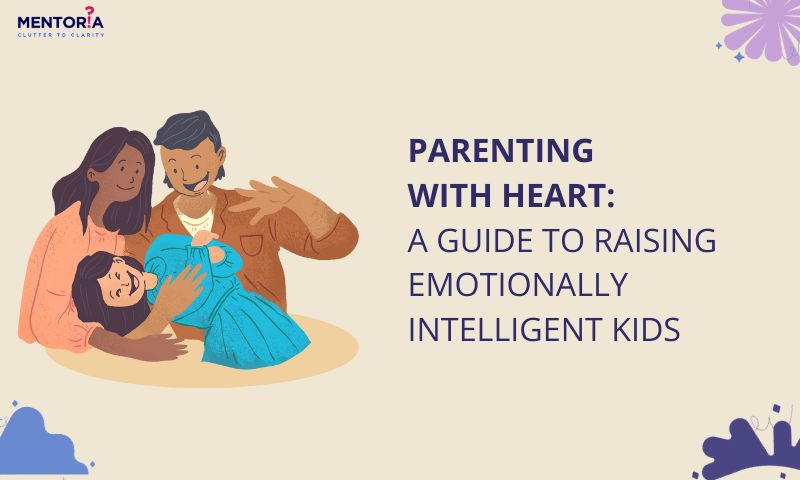Parenting With Heart: A Guide To Raising Emotionally Intelligent Kids

Imagine that your child is having a tough day at school, and you ask them, “What’s wrong, dear?” They glance up with teary eyes, and instead of responding with silence or a shrug, they say, “I felt left out at recess, and it made me sad.” It’s a moment of heartwarming connection, a glimpse into the world of emotional intelligence, and you, as a parent, have played a crucial role in nurturing this skill.
Raising emotionally intelligent children is like giving them a superpower – the ability to understand, express, and manage their feelings effectively. In this parent’s guide, we’re going to dive into the nitty-gritty of how to foster emotional intelligence in your little ones. Get ready to equip your children with a vital set of life skills that will help them navigate the complex world of emotions and relationships, all while strengthening the unbreakable bond between you and your child.
Understanding Emotional Intelligence
Let’s start from the beginning. Emotional intelligence, often referred to as EQ (Emotional Quotient), is the ability to recognise, understand, manage, and express one’s emotions. It also includes empathy, the ability to recognise and understand the emotions of others, and the skill to manage relationships effectively.
Now, here’s the kicker: Emotional intelligence is not something innate or set in stone. It’s a skill that can be nurtured and developed over time. So, how can we help our children become emotionally intelligent beings?
Building Blocks Of Emotional Intelligence
- Labelling Emotions: Begin by teaching your children how to label their feelings. Use simple terms like “happy,” “sad,” “angry,” or “excited” to help them identify what they’re experiencing. This basic emotional vocabulary is essential.
- Express, Don’t Suppress: Encourage your little ones to express their feelings in a healthy way. Let them know that it’s okay to cry when they’re sad or laugh when they’re happy. Holding back emotions can be detrimental in the long run.
- Empathy Matters: Teach your kids to put themselves in others’ shoes. When they see someone else sad, ask them how they think that person feels. This simple act fosters empathy and helps them connect with the emotions of others.
- Problem Solving: As your children grow, involve them in problem-solving discussions. Ask open-ended questions that encourage them to think critically about how to handle challenging situations. This process will help them develop emotional resilience.
The Power Of Positive Reinforcement
Remember, every time you notice your child making an effort to understand their emotions or show empathy, be sure to praise them. Positive reinforcement is a powerful tool in your parenting kit. It lets them know that you value their emotional growth and encourages them to keep developing their emotional intelligence.
Emotions In Everyday Life
Now that we’ve covered the basics, let’s explore how you can weave emotional intelligence into your child’s daily life.
- Storytelling: Children love stories. Share books or personal anecdotes that revolve around characters dealing with emotions. This not only teaches them about feelings but also provides valuable lessons on how to manage them.
- Problem-Solving Games: Engage in games that involve decision-making and problem-solving. This could be as simple as playing “What would you do if…?” scenarios. It’s an engaging way to foster critical thinking and emotional resilience.
- Open Communication: Create a safe space for your children to express their feelings. Whether they’re excited about a new friend or upset about a school assignment, let them know you’re there to listen without judgement.
- Model Emotional Intelligence: Children learn by example. Demonstrate emotional intelligence in your own life. When you’re feeling stressed, share how you’re managing it. If you make a mistake, admit it and discuss how you’re going to make amends. This shows them that it’s okay to be imperfect and that emotional growth is a lifelong journey.
Handling Negative Emotions
Life is a rollercoaster, and your child will undoubtedly encounter negative emotions. Here’s how you can help them navigate these challenging moments:
- Normalise Emotions: Let your child know that everyone experiences negative emotions like anger, sadness, and frustration. It’s a part of life, and it’s okay to feel this way at times.
- Mindfulness: Teach your child simple mindfulness exercises to help them stay present and manage difficult emotions. Breathing exercises or counting to ten before reacting can make a world of difference.
- Problem-Solving: Encourage your child to find solutions to their problems. Ask open-ended questions like, “What do you think we can do about this?” This empowers them to take control of their emotions and actions.
- Seeking Support: Emphasise that it’s okay to seek support when dealing with overwhelming emotions. Whether it’s a trusted adult, teacher, or counsellor, let your child know they have a network of people who care about their well-being.
Embracing Failure And Resilience
Failure is a part of life, and it’s essential for building emotional resilience. Here’s how you can help your child embrace it:
- Growth Mindset: Encourage a growth mindset by praising effort and persistence, rather than just success. This teaches your child that setbacks are opportunities for growth.
- Learn from Mistakes: After a failure, have a conversation about what your child has learned from the experience. This shifts the focus from the negative outcome to personal growth.
- Don’t Overprotect: While it’s natural to want to shield your child from disappointment, allowing them to face minor setbacks can help them develop resilience.
Building Strong Relationships
One of the core aspects of emotional intelligence is the ability to build and maintain healthy relationships. Here’s how you can guide your child in this area:
- Active Listening: Teach your child the art of active listening. Encourage them to pay full attention when someone is talking to them, which fosters empathy and better understanding of others.
- Conflict Resolution: Help your child learn to resolve conflicts constructively. Model effective conflict resolution in your own relationships and provide guidance when they encounter disputes with friends or siblings.
- Friendship Values: Discuss the qualities of a good friend with your child. This helps them recognise and form healthy friendships. Encourage open conversations about their friends and offer support when needed.
Mentoria’s Role In Guiding You To Parental Success
Raising emotionally intelligent children is a journey that every parent should embrace. It’s not just about preparing them for success in the classroom or the workplace; it’s about equipping them with the tools to navigate the complexities of the human heart. As parents, we have the profound opportunity to nurture empathy, self-awareness, and emotional resilience in our children. These skills will serve them well throughout their lives, in their relationships, their careers, and their own journey into parenthood.
At Mentoria, we understand that parenting is a profound responsibility. Our dedicated team of experts is here to support you in your quest to raise emotionally intelligent children. We offer tailored programs through our corporate workshops and resources to help you navigate the intricacies of nurturing emotional intelligence in your child. Whether you’re looking for guidance on fostering empathy, managing emotions, or building strong parent-child connections, we’ve got you covered. Mentoria is your partner on this transformative parenting journey.









